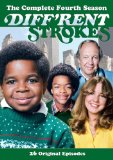| Reviews & Columns |
|
Reviews DVD TV on DVD Blu-ray 4K UHD International DVDs In Theaters Reviews by Studio Video Games Features Collector Series DVDs Easter Egg Database Interviews DVD Talk Radio Feature Articles Columns Anime Talk DVD Savant Horror DVDs The M.O.D. Squad Art House HD Talk Silent DVD
|
DVD Talk Forum |
|
|
| Resources |
|
DVD Price Search Customer Service #'s RCE Info Links |
|
Columns
|
|
|
Diff'rent Strokes: The Complete Fourth Season
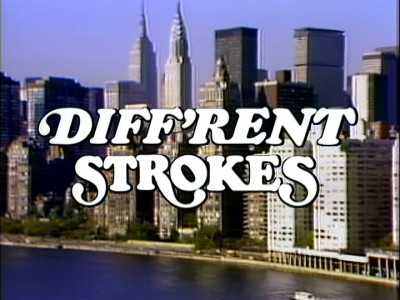
The Show:
"Diff'rent Strokes" ran from 1978-1986, this 3-disc set is the 1981-82 season. The premise was a rich white man, Philip Drummond (Conrad Bain) who lives in a penthouse on New York's Park Avenue adopts his housekeeper's two black sons Arnold (Gary Coleman) and Willis (Todd Bridges) after she passes. In addition to their racial differences, Arnold and Willis lived in low-income conditions in Harlem, so they think they have it made when they move from there to Drummond's penthouse, living there with him and his daughter Kimberly (Dana Plato). The show deals primarily with the clashes of race, culture and wealth, all in a humorous way of course but does get on the preachy side at times. Of course, that's part of its charm for many of its fans.
The show really seems to have found its "groove" by the fourth season. I had re-watched the first season on DVD when that was released, and found much of the humor forced but here it seems much more natural. Willis seems much more comfortable with being part of the Drummond household, sometimes having too much confidence in himself, and both he and Arnold refer to Philip as "Dad" instead of "Mr. Drummond." Gary Coleman's "whatyoutalkinbout?" had of course become a catch-phrase by now and was worked into almost every episode. (I personally started watching the show during the 1982-83 season, where it aired back-to-back with "Silver Spoons" which was a favorite of mine. I later caught the earlier "Diff'rent Strokes" episodes when they began airing in syndicated reruns. I watched the show until the end of its network run in 1986, even its disastrous final season on ABC, but still missed a few episodes.)
Supporting characters who show up in several episodes include the maid Adelaide (Nedra Volz), Philip's ditzy sister Sophia (Dody Goodman), Arnold's best friend Dudley (Shavar Ross), and Willis' girlfriend Charlene (Janet Jackson- yes, really).
Shout! Factory has taken over from Sony Pictures Home Entertainment in releasing this fourth season set. Episodes are on 3 dual-layer discs. Here's a rundown of each:
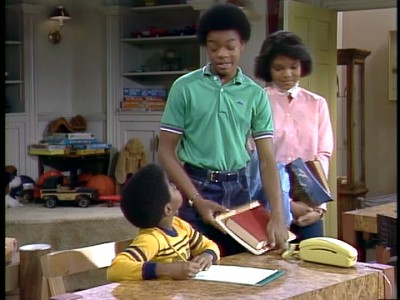
Willis and his girlfriend Charlene feel they're ready to take the next step in their relationship, so Willis tries to get the whole apartment to himself. While pretty tame by today's standards, this seems pretty daring for 1981.
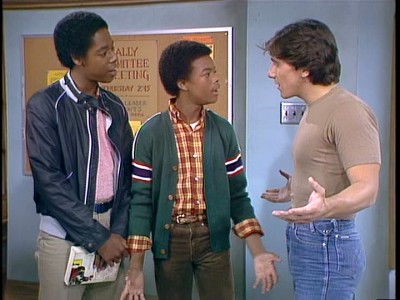
It's Willis' first day of high school as a freshman and he wants to become friends with some "cool" seniors. They tell him he can be part of the gang if he scores some "grass" for them.
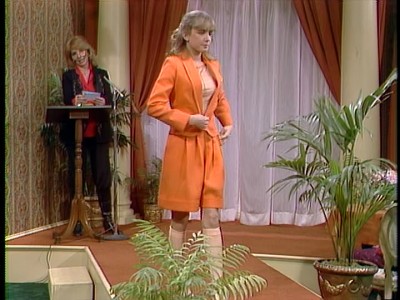
Jumping out of chronological order, this episode takes place during the summer and the kids find summer jobs. Kimberly lands a job as a stock girl at a department store, and gets a big break with a modeling gig.
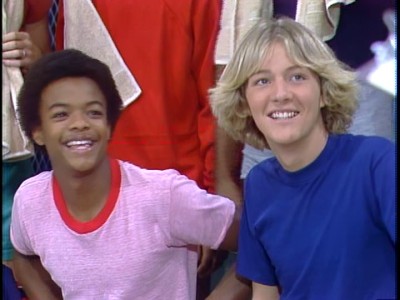
Affirmative Action is an issue presented in this episode, where Philip is sued by one of his white employees being passed for a promotion in favor of a less-qualified black candidate. Willis is OK with this, but then objects to not being selected for the school's basketball team in order to make room for a "token white guy".
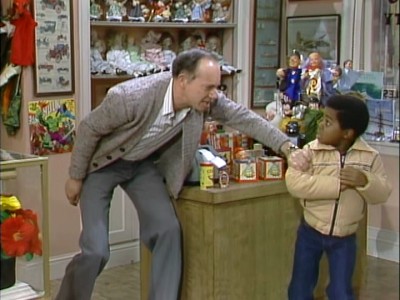
Arnold is accepted as a member of the "Barracudas" gang at his school (led by The Gooch, a supporting character who comes up often in the series but is never actually shown). For his initiation he is required to steal from a store, which lands him in hot water.
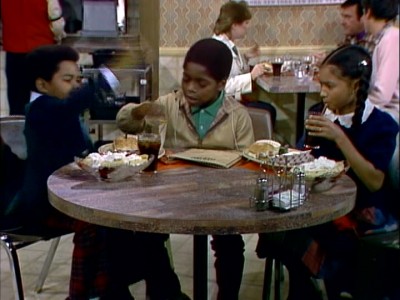
Arnold wants to act grown-up by taking his friend Diane out on a "real" date, but finds he still has a few things to learn.

Kimberly goes on her first unsupervised trip with a friend to a ski resort, but finds out her friend has more than skiing in mind when she invites two guys to join them. This one also seemed pretty daring for the time; I had not seen this one until now.
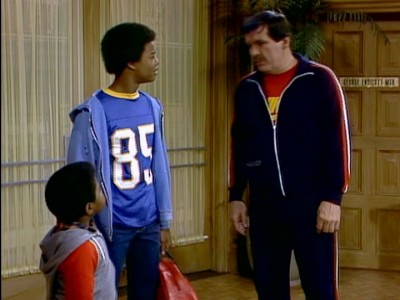
Philip is honored at his health club for his achievement in a competition, but it turns out Arnold and Willis aren't welcome there because of their race.
Since I know many people have issues with edits made to TV episodes, I have to point out an issue here: There is a scene taking place in the apartment with Kimberly working out to music, and the music heard here is a generic synth score that was obviously used to replace another song used in the original episode. The generic music is noticeably louder than anything else in this episode and all ambient sounds are muted when this music plays. In addition, there is a still from the show during the end credits that does not appear in the actual episode of Kimberly and Adelaide working out together- apparently there was a licensing issue with the song being used, so the scene was cut short to the bare minimum to avoid using too much of the replacement music. I personally don't consider TV episodes to be as "sacred" as movies, but those who are sensitive to alterations should be forewarned. I did not notice any other music changes in the other episodes, some of which are more music-heavy than this one. Interestingly this one episode is also encoded in 2-channel audio rather than 1-channel as the rest are, but all the sound stays in the center channel with Pro-Logic enabled anyways.
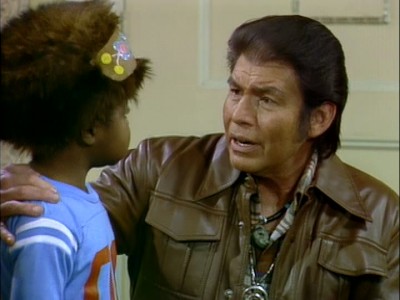
Philip's construction company's latest project becomes the subject of controversy when it's discovered the site is an ancient Native American burial ground.
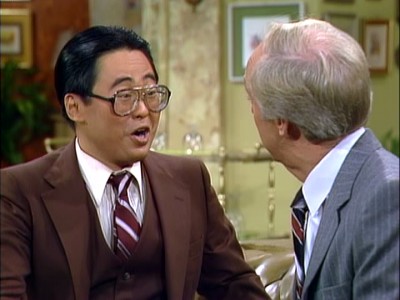
Philip gets a visit from a Korean man claiming to be his long-lost son, as Philip had a love affair with his mother during the Korean War.
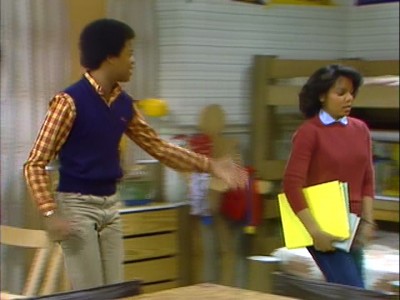
Willis, being a bit over-confident as he is in many episodes, takes his girlfriend Charlene for granted one too many times and she dumps him. Arnold then schemes to get them back together.
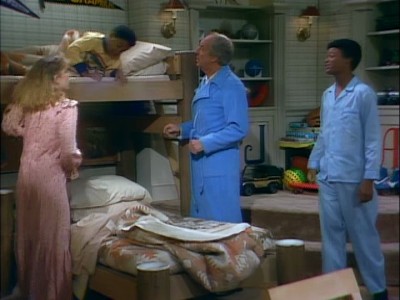
The family's nights become disrupted when Arnold keeps waking up scared from bad dreams, and a psychologist steps in to help.
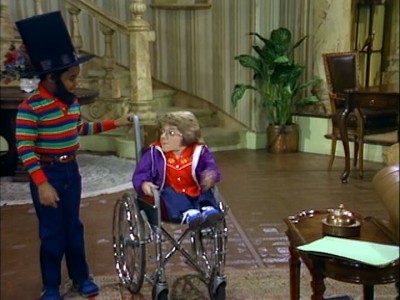
Arnold's handicapped friend Kathy (who appeared in four episodes of the show altogether, played by Melanie Watson) comes by to visit. She's learning how to walk on crutches but feels self-conscious about being seen. Meanwhile Arnold plays Abraham Lincoln in the school play and gets stage fright himself.
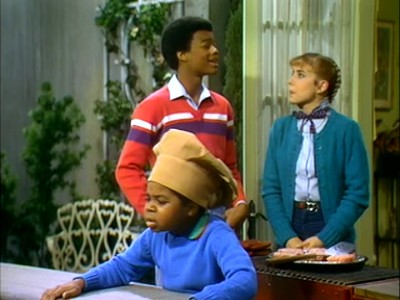
The family along with Aunt Sophia are trapped in the apartment when a fire breaks out in the building. There are a couple scenes in the rarely-seen lobby on the ground floor in this episode, but it doesn't match what was in the first season's opening.
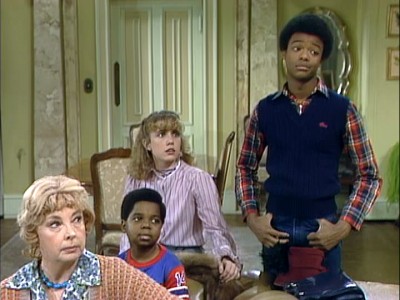
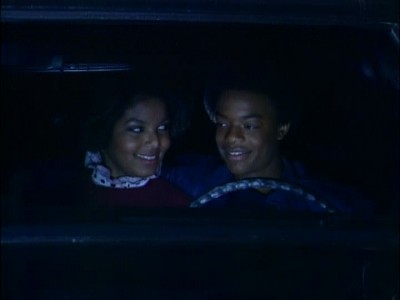
In order to impress Charlene and keep from losing her to another guy with a driver's license, Willis 'borrows' Philip's limousine and takes her for a ride.
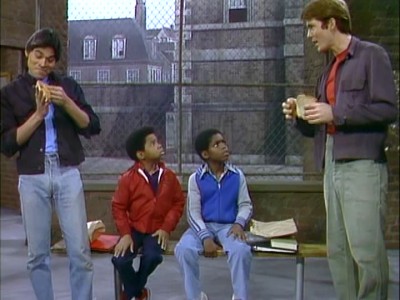
This is a two-part saga, where Arnold and his friend Dudley are tormented by two high school kids during lunch break. They threaten to beat them up unless they hand over their lunches every day AND pay them for eating them! Willis tries to defend the tormented kids.
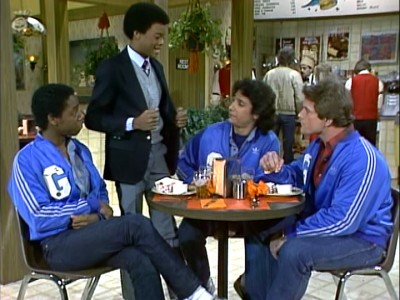
Willis, being a little too full of himself again, gives Arnold less attention as he concentrates on getting into the "Letterman's Club" at school.
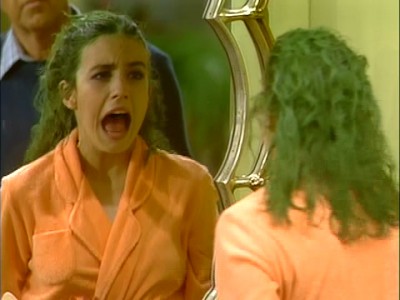
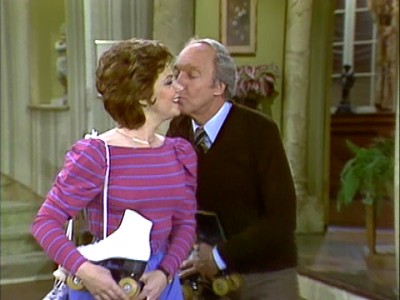
Philip gets a girlfriend in this episode, but is she too low-class for him? (Evidently so, as he ended up marrying someone else a couple years later, though the relationship appears to go rather well in this one show.)
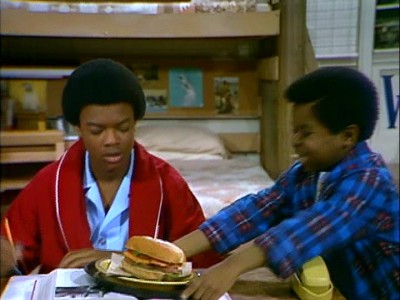
Willis saves Arnold's life after pushing him out of the way of a falling piano (because in New York pianos are always being hoisted up tall buildings) but Arnold shows a little too much gratitude.
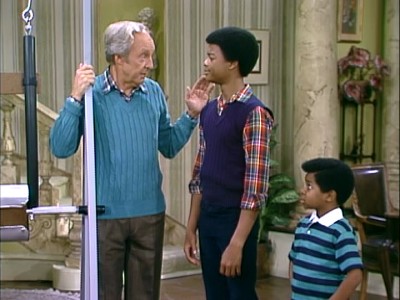
Philip brings home a stress-testing device, and it turns out Willis is the one who is really stressed out.
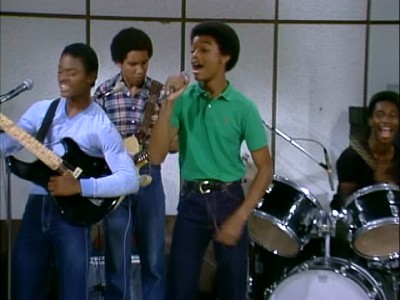
Willis and his friends form a band called the Afro Dizziacs, and they aren't too bad. Conflict arises however when they have to decide between Charlene or Kimberly for a female singer. A number of surprisingly good songs are performed in this episode. Todd Bridges and Dana Plato appear to be doing their own vocals.
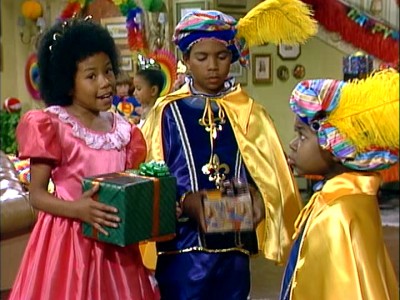
Arnold invites a girl he likes to his birthday party, but is devastated when she arrives with a date.
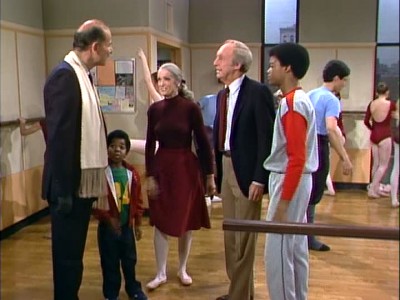
Arnold visits Kimberly's ballet class (taught by Lilyan Chauvin, whom you might recognize from 1984's Silent Night, Deadly Night as Mother Superior) and decides to take it up himself, but Willis thinks he'll become a "sissy" and tries to discourage him. A prominent Russian ballet star visits the class, but it turns out he's only fictional. He's played by Roger C. Carmel, who appeared in many TV series including the role of Harry Mudd in two "Star Trek" episodes.

All episodes appear to be from the broadcast masters, presented without commercials or the NBC voice-overs during the end credits announcing upcoming shows (remember when that was the ONLY intrusion networks would make on their shows?) The Sony Pictures Television closing logo replaces what was originally the Embassy Television logo at the end.
Picture:
"Diff'rent Strokes" was shot on videotape in 4x3, the standard TV format of the era. It looks about as good here as it did when originally broadcast, although there are some digital compression artifacts in some episodes (but not as bad as what I have seen on some current standard-definition digital broadcasts). Viewed on a modern HDTV, there is noticeable dot crawl (older material shot on video will usually have its flaws magnified on an HDTV) but picture quality overall is on par with other video-based material of the early 80s. One funny thing I just noticed, watching on my large HD screen instead of the old 13-inch bedroom CRT (while my parents were watching more important stuff on the bigger TV in the living room), was that the linoleum in the Drummonds' living room was the same type I had in my old bedroom, and no I did not live on Park Avenue!
Sound:
The sound is in Dolby Digital 1-channel mono, except on the aforementioned altered episode encoded in 2-channel. Broadcast TV was still mono at this time and most audiences were listening through small TV speakers, though network audio feeds had been upgraded to higher fidelity. Being critical I noticed a background tone in some episodes, which is common in TV productions of this era- it likely wasn't noticed by viewers of the original broadcast. The audience noise (applause and laughter) does get annoying pretty quick which kept me from playing this at too loud a volume; though this show was actually taped with a live audience, most likely they were told when to react. There are a few unique reactions such as "uh-oh's" when things in the storyline go wrong, but still not the same as an audience at a regular live show.There are no subtitles on the discs, but there are standard closed-captions which appear to be made for recent repeat broadcasts. This presents a problem on newer equipment as standard captions have become increasingly harder to access. Just because I'm obsessive and have to be able to get to every bit of information on my media, I have a secondary component video connection from my Blu-Ray player to my TV, and use that input with the player set to 480i in order to view discs with closed captions. Higher resolutions will not carry the caption signal, neither will HDMI at any resolution. Since hundreds of DVDs already include standard captions, and this recent release having them as the only option for hearing-impaired viewers, I feel that internal closed-caption decoders should be included in future players that could overlay them on the HDMI-outputted video (analog video connections are already being phased out entirely on players as it is.) I have two DVD playback programs on my computer which can do this, so it should not be too difficult on a regular disc player.
Extras:
No extras are included on this season. (Season 1 included an interesting retrospective with the surviving cast, as well as unmemorable commentary on the first episode.)
Packaging:
This 3-disc set is in a clear standard-size keepcase, with a flap holding discs 1 and 2. There is no standard insert, but the reverse side of the cover gives a synopsis of each episode.
Final Thoughts:
If you were a fan of the show during its original run, you'll enjoy seeing it again here as I did. Despite some elements being dated, most of the episodes still hold up today. Although these shows were probably never meant to be viewed all at once, I found it rather amusing that so many of them set up potential advances for the series (such as Philip's award and issues with the health club, his girlfriend Delores, Willis' band, and Arnold's ballet career) only to be completely forgotten about by the next episode. Purists may have issues with the one edited episode, so what might be right for some may not be right for them.
Jesse Skeen is a life-long obsessive media collector (with an unhealthy preoccupation with obsolete and failed formats) and former theater film projectionist. He enjoys watching movies and strives for presenting them perfectly, but lacks the talent to make his own.
|
| Popular Reviews |
| Sponsored Links |
|
|
| Sponsored Links |
|
|
| Release List | Reviews | Shop | Newsletter | Forum | DVD Giveaways | Blu-Ray | Advertise |
|
Copyright 2024 DVDTalk.com All Rights Reserved. Legal Info, Privacy Policy, Terms of Use,
Manage Preferences,
Your Privacy Choices | |||||||









